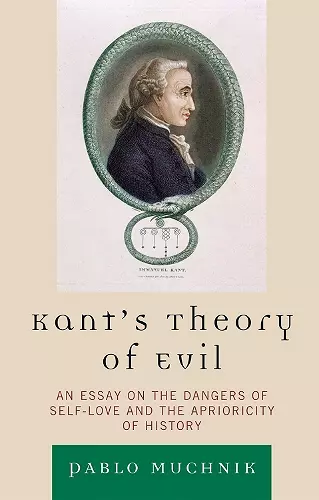Kant's Theory of Evil
An Essay on the Dangers of Self-Love and the Aprioricity of History
Format:Hardback
Publisher:Lexington Books
Published:3rd Dec '09
Currently unavailable, and unfortunately no date known when it will be back

Kant's Theory of Evil: An Essay on The Dangers of Self-Love and the Aprioricity of History presents a novel interpretation and defense of Kant's theory of evil. Pablo Muchnik argues that this theory stems from Kant's attempt to reconcile two parallel lines of thought in his own writings: on the one hand, a philosophy of history of Rousseauian inspiration and naturalistic tendencies; on the other, the metaphysical project of founding morality exclusively on a priori grounds. The syncretism of Kant's view, as exemplified by the resulting moral anthropology in Religion within the Limits of Mere Reason, explains its persistent allure and elusiveness among Kantian readers. Muchnik's reconstruction solves some of the most intractable problems surrounding Kant's position, and is designed to break the deadlock existing between contemporary rival schools of interpretation, torn between Kant's naturalistic tendencies and his moral individualism. The "quasi-transcendental" conceptual apparatus presented in these pages will open up new paths of investigation in Kant, and influence the way we approach the problem of evil in general.
Pablo Muchnik's Kant's Theory of Evil provides a fresh and creative perspective on Kant's thinking about human responsibility for good and for evil. It offers a new interpretive strategy for the resolution for key issues that frequently perplexed earlier commentators. Muchnik offers a persuasive defense of the systematic importance of Kant's account of evil within the critical project, locating it as key part of an architectonic of practical reason and a central element of the moral anthropology that begins to emerge in the latter stages of Kant's work. -- Philip J. Rossi S.J., Marquette University, Marquette University
This book does a very persuasive job of displaying the consistent and systematic nature of Kant's theory of evil. In so doing, the work elevates the account of evil to a more central position in Kant's overall project, a significant contribution in itself. Along the way, Muchnik navigates the complex by-ways of both the primary and secondary sources with impressive and reassuring command. This book needs to be taken into account by anyone doing serious work on Kant's practical philosophy. -- Gordon Michalson, New College of Florida
Pablo Muchnik has put his finger on the most difficult problem in Kant's theory of freedom: how can Kant's conviction of the radical freedom of every individual human being to choose between good and evil be reconciled with his equally firm conviction that the human race as a whole has a tendency toward evil? He separates a priori and empirical strands in Kant's complex analysis of human action to resolve this paradox; no one can henceforth discuss this profound issue without taking account of Muchnik's careful study. -- Paul Guyer, University of Pennsylvania
Kant's Theory of Evil is a rich and stimulating work that directly confronts some of the most important and intractable problems of Kant's ethics and moral psychology. Muchnik is undoubtedly right in claiming that in his later work, Kant is searching for a way of addressing the first-person experience of human life that is neither a form of naturalistic psychology nor just a part of a pure metaphysics of rational agency. Kant never quite figured out how to square this circle, but Kant's Theory of Evil offers a promising account of how, from basic Kantian insights, we might go on to do so. -- July 19, 2010 * Notre Dame Philosophical Reviews *
Kant's account of the radical evil in human nature belongs to the 'anthropological' side of Kantian ethics which is either totally ignored or wrongly interpreted in standard caricatures of Kantian ethics. But it has recently been receiving more attention from Kant scholarship. Muchnik brings together the different aspects of Kant's theory of evil that often seem to be in tension. In the process, he contributes in a variety of ways to our understanding of Kant's moral psychology. -- Allen Wood, Indiana University Bloomington
Strongly recommend Muchnik's Kant's Theory of Evil. It is written with a sort of panache that is rarely found in contemporary philosophical scholarship. Throughout, there is a robust engagement with recent secondary literature and Muchnik confronts many of the most difficult problems in Kant's practical philosophy with courage and originality. * Kantian Review *
ISBN: 9780739140161
Dimensions: 240mm x 162mm x 21mm
Weight: 490g
216 pages